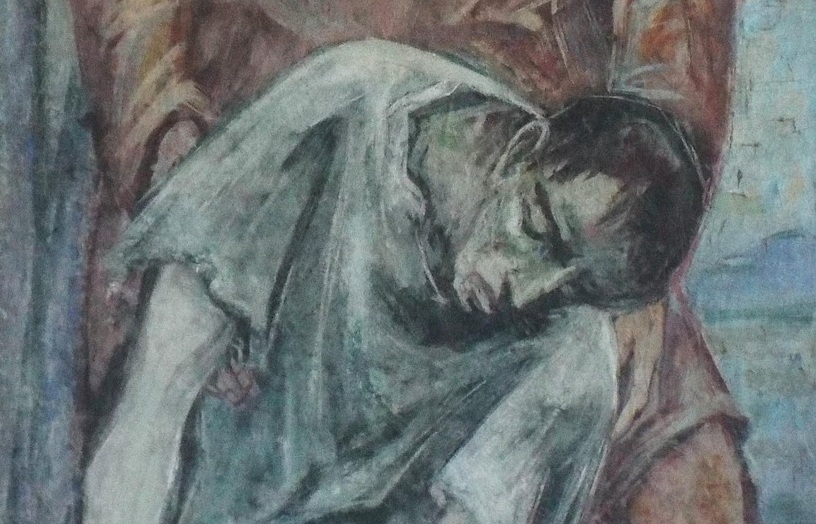What we are to notice here, St. Augustine says, is the Lord’s gentleness and the Lord’s truth—how gentleness and truth are in Christ in harmony and not at odds. “The Lord is gentle, the Lord is longsuffering, the Lord is tender-hearted; but the Lord is also just, the Lord is also true,” he preached. “Pay attention…all who love gentleness in the Lord, and let them fear his truth,” he said.[1] That’s the takeaway; that’s what we’re supposed to learn.
The story is famous: a woman is caught in adultery, brought before Jesus by scribes and Pharisees. It’s a test; it has nothing to do with justice. Jesus is being tested; “the Lord’s gentleness is being tested by his enemies” is how Augustine put it.[2] They think they have him cornered, you see; because if he is too merciful with this woman and downplays the gravity of her sin, if he suggests adultery isn’t a capital crime (as Torah says it is) worthy of the punishment of stoning, then Jesus is no prophet because he will have contradicted the word of God.[3] But, on the other hand, if he does agree to her stoning, if he agrees she should be put to death, then he will have contradicted Roman law; for it is the Romans, you see, who in Jesus’s day reserved the right to exact capital punishment.
That’s the test. They think they have Jesus pinned between God’s law and Roman law. That poor woman is simply a useful victim; I mean, a good defense lawyer would be all over this case. How, for instance, was she caught in the act of adultery? Think about that for a minute. Who was spying on her? Where’s the man in all this? This sounds like a setup. For those of you who know your Bible, you’re probably thinking about the story of Susanna in the book of Daniel; allusion to that story is obvious.[4] None of this, as I said, has anything to do with justice. They’re not after the woman; they don’t care about the woman; they’re after Jesus. They are perfectly willing to destroy that woman’s life because of how much they hate him. Just think what that poor woman must’ve been going through, not knowing at all what was going to happen. Imagine her fear.
So, what does Jesus do? “What answer did Truth give?” is how Augustine posed the question.[5] It is beautiful what he did, what first he said. Remember that Augustine said the lesson we’re to learn is how in Christ gentleness and truth are in harmony, and that’s exactly what we see. Jesus first speaks to the accusers, to the scribes and Pharisees, and he says to them, “Let him who is without sin among you be the first to throw a stone at her.”[6] Now Jesus here is not denying the seriousness of the sin of adultery, not at all; libertine readings of this story are simply misreadings. Rather, Jesus looks this woman’s accusers in the eye and basically asks them, “Are you sure? Are you ready to stand before God as this woman’s accuser?” Jesus knew, you see, and they knew too, that accusers bear a solemn responsibility before a perfect and punishing God.[7] And so, Jesus asks them if they’re sure they want to go through with it, and it turns out they don’t, really. Beginning with the eldest, one by one the woman’s accusers walk away.[8] Jesus hadn’t denied the truth of God’s law, nor had he contradicted Roman law—Jesus will make his own way to Pilate, thank you—instead, by means of the truth, Jesus was gentle. And he says to her, “Woman, where are they? Has no one condemned you?”[9] Just imagine what she must’ve been thinking, to feel the fear leaving her body, feeling love instead.
But what are we supposed to do with this? How should this change our lives, remembering again that in Christ are both gentleness and truth? Again, I’ll tell you what Augustine said since he’s been preaching alongside me all along. Augustine put it this way: “You were bad yesterday? Be good today…At least change it tomorrow.”[10] We should put ourselves in the place of that beautiful woman, in that moment of mercy, and receive the grace necessary to change; that’s what Augustine was saying. “[G]o, and do not sin again,” Jesus said to the woman; we should apply those words to ourselves—today.[11]
We should not, Augustine said, let despair conquer us; God will indeed forgive you, absolve you of your worst sins, so go to confession, quit putting it off! God will be gentle with you; his priests will be gentle with you.
But also, don’t squander the moment. I mean, what if, hearing those words, the woman got up, dusted herself off and said, “I’m pretty busy right now. Let’s find another time. I promise we’ll get together soon.” I mean, what if she put Jesus off like that, nice as she could be? Augustine said that when we put off moments of grace like that, when we delay change and conversion, when we presume that we’ll always be able to go back to God some other time, that’s when we are, he said, believe it or not, “endangered by hope.” When we delay acting on the grace God offers today, hoping God will always show up when we want him to, on our schedule, when it’s convenient for us, maybe later, some other time—that’s presumption, that’s false hope, and that’s dangerous, Augustine said. For God “made the day of death uncertain,” he said.[12] So why not change your life today?
Which is the question. What am I waiting for? What are you waiting for? Jesus’s words here, I think, are meant for us, not just for that woman—those words of mercy, that invitation to sin no more, to finally be the Christian you say you want to be—the servant, the contemplative, at last generous. I mean, what if we walked out of this Mass today changed like that? Amen.
[1] Augustine, Homily 33.7
[2] Ibid. 33.4
[3] Leviticus 20:10; Deuteronomy 22:21
[4] Daniel 13:1-64
[5] Homily 33.5
[6] John 8:7
[7] Leviticus 17:6-7
[8] John 8:9
[9] John 8:10
[10] Homily 33.7
[11] John 8:11
[12] Homily 33.8
© 2025 Rev. Joshua J. Whitfield










